2018年01月07日
Newsweek世界版(英語)にて国立音楽院が特集されました
先日発売された「ニューズウイーク日本版」に引き続き
世界中で発売されているNewsweekの英語版(2018年1月5日-1月12日号)でも国立音楽院が紹介されました。
Kunitachi Music Academy was featured in “Newsweek issues 01.05.2018 – 01.12.2018”. Available now around the world.
■英語版 Newsweek issues 01.05.2018 – 01.12.2018
http://www.newsweek.com/2018/01/05/issue.html
“freedom, creativity, and independence”
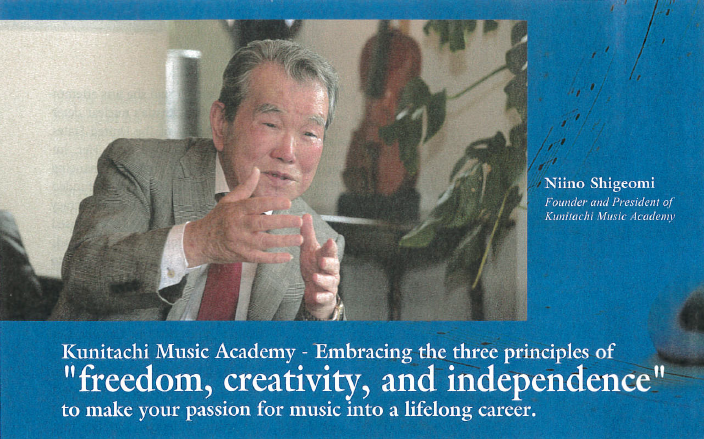
Unlocking the potential of children with infant eurhythmics
Though there are any number of schools that teach music, they do not necessarity prepare their students to obtain employment in a music-related field after their graduation. For this reason, Kunitachi Music Academy was founded in 1985 under the slogan, “Transform your passion for music into a lifelong career!” KMA started as the Music Home Classroom in Kunitachi City in 1967, and today it is located in Setagaya, Tokyo. It was the first music school in Japan to provide comprehensive training for infant eurhythmics instructors. Currently, it has twenty-one faculties and departments, including its regular course in eurhythmics.
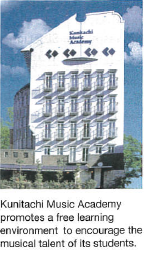
Infant eurhythmics uses music and rhythm play to develop the minds of children. Niino Shigeomi, the founder and president of Kunitachi Music Academy, said the following about the origins of KMA’s infant eurhythmics course: “At the time I started the Music Home Classroom, I noticed that babies just four months of age were already responsive to the sound of a piano, moving their hands and feet happily along with the music. We are very impressionable in our infancy while our human individuality and ability are still taking shape. It occured to me that this might be the ideal time to allow people to physically experience musical rhythm and achieve a sense of harmony.” This flash of inspiration resulted in the creation of infant eurhythmics, a program to unlock the hidden potential and natural sensitivities of children.
Today, infant eurhythmics classes are being administered across the country in cultural centers and similar facilities. Moreover, KMA’s regular course in infant eurhythmics trains nistructors with a unique curriculum based on research in art and educational theory, developmental psychology, and music therapy. KMA also offers its own certification system and helps its students find work after they graduate.
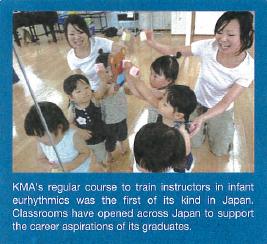
The growing demand for music in the field of social welfare
In addition, Kunitachi Music Academy has been involved in music therapy for seniour citizens from an early date, having established its Department of Music Therapy in 1995. There are two types of music therapy: receptive therapy in which the patient relaxes his or her mind and body while listening to music, and active therapy in which the patient sings, plays an instrument, or moves his or her body. Active music therapy espesially has been adopted in many fields of social welfare, including in nursing care for senior citizens. It has been reported to aid in the treatment of helth issues such as depression and dementia.
Niino Shigeomi emphasized that music therapy was also useful for health promotion and preventive care in healthy individuals. He added that, “We developed rejuvenation curthythmics by applying the techniques of music therapy for senior citizens to our knowledge of infant eurhythmics. One can rejuvenate both the mind and body just through moving and singing happily to music.”
Rejuvenation eurhythmics has now been introduced to over ninety care facilities across Japan where music therapists and eurhythmics instructors who have graduated from KMA are activity engaged. However, KMA graduates are not hired only in care facilities. They have also branched out to cultural centers and many other areas of service.
Opening up new possibilities with abroad range of courses of study
KMA devotes attention to a wide variety of practical fields where students will be able to put their love of music to use in the workplace. As Niino Shigeomi explained, “In our piano tuning course, we provide the instruction needed to become nationally certified as a piano tuner. In our guitar craft and repair course, we train guitar craftsmen(luthiers). In our violin-making course, students can learn the techniques of violin production.”
What is most interesting of all is that KMA’s wind instrument repair course also teaches how to perform music in order to train technicians who can both play and repair their instruments. According to Mr.Niino, “An instrument repair will become a true specialist if he or she can play the instrument, too. Once one learns to perform music, one can he call himself a specialist.” To guarantee its students work after their graduation, KMA has set up wind instrument repair workshops where they are pmployed.
KMA also strives to guarantee work for all its other students, including graduates in the field of acoustic engineering, who have studied the latest sound and recording technologies. Naturally, KMA supports aspiring professional musicians as well, offening courses on diverse musical styles and genres in its Department of Pro Music. For those wishing to study abroad, KMA has a partnership agreement with Trinity Laban Conservatoire of Music and Dance, a prestigious British school that shares KMA’s philosophy to “Transform your passion for music into a lifelong career!” More and more people are taking the opportunity to go overseas to partake in musical exchanges and build international friendships.
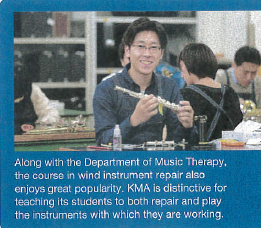
In a place of learning, all people with a dream, no matter their background, should be able to come together and absorb themselves in their passion for music. Due to the learning environment fostered by KMA, grade school dropouts need not hesitate to enroll. They can even receive a high school diploma thanks to KMA’s partnership with correspondence schools offering high school education. On the order hand, university students and working adults can benefit from weekendonly classes utilizing a variety of different teaching methods. KMA also accepts handicapped students, who are taught in inclusive classes alongside students without special needs. In the 14th Gold Concert Selection, the competition for handicapped musicians held in 2017, the grand prize was won by KMA graduate Ota Masataka. KMA is thus playing an active role in widening the playing field for the handicapped. As a result of KMA’s approach to learning, the academy accommodates students of every generation, from ages twelve to seventy-one, and has turned out over 6,700 graduates to date.
KMA’s three core principles are “freedom, creativity, and independence”, embodied in the academy’s motto: “unconditional freedom of mind”. On the basis of these ideas, KMA has forged a one-of-akind instructional system, unlike that found in any standard school or college of music, in which the students can choose any classes of their preference regardless of the faculty administering them. It would be fair to conclude that Kunitachi Music Academy ghas fostered a truly extraordinary learning environment that permits individuals to challenge their full potential and transform their passion for music into lifelong careers.
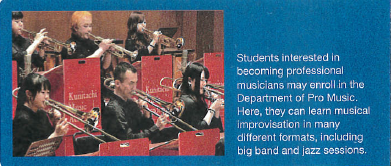
■販売国
・ABU DHABI ・ALBANIA ・AUSTRALIA ・AUSTRIA ・BAHRAIN ・BELGIUM ・CHINA ・CROATIA ・CYPRUS ・CZECH REP ・DENMARK ・DUBAI ・EGYPT ・FINLAND ・FRANCE ・GERMANY ・GIBRALTAR ・GREECE ・HOLLAND ・HONG KONG ・HUNGARY ・IRELAND ・ISRAEL ・ITALY ・JORDAN ・KUWAIT ・LATVIA ・LEBANON ・LITHUANIA ・LUXEMBOURG ・MALTA ・MONTENEGRO ・MOROCCO ・NEW ZEALAND ・NIGERIA ・NORWAY ・OMAN ・POLAND ・PORTUGAL ・QATAR ・MALAYSIA ・ROMANIA ・SAUDI ARABIA ・SERBIA ・S LEONE ・SINGAPORE ・SLOVAKIA ・SLOVENIA ・SOUTH AFRICA ・SPAIN ・SWEDEN ・SWITZERLAND ・TURKEY ・UK ・US ・ZIMBABWE





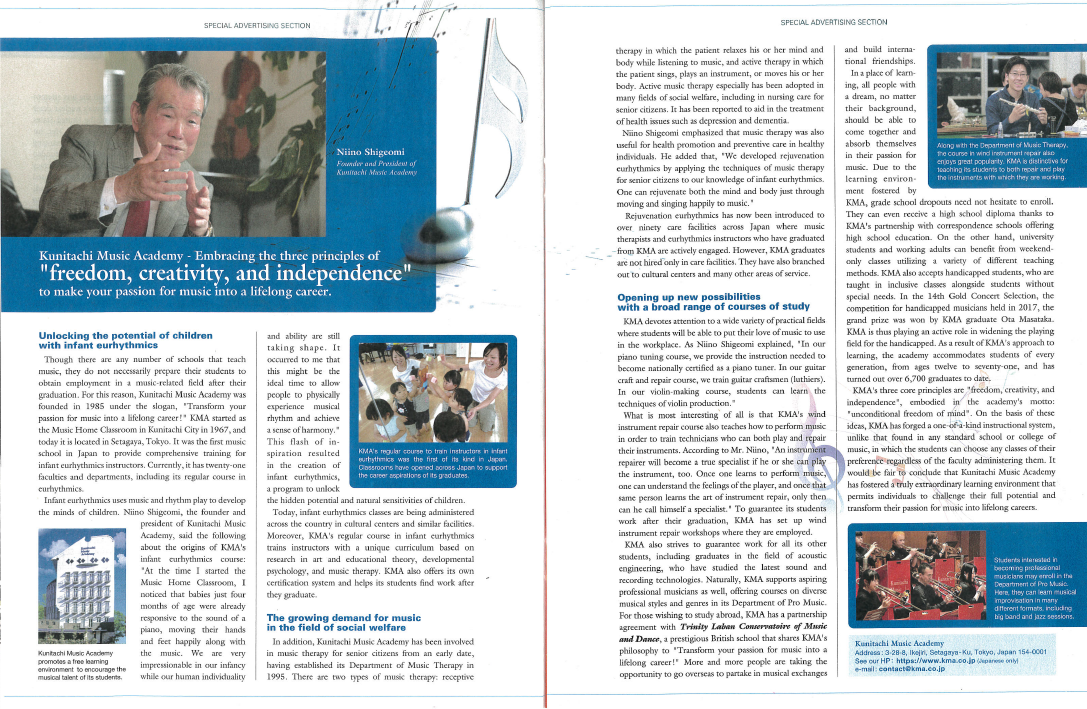

 が便利!
が便利!


